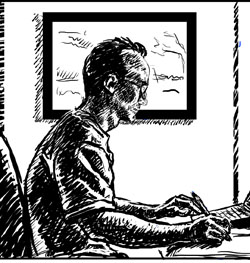Student Profile: Sketches of an Educator
A one-man campaign to move beyond the purely verbal
By Siddhartha Mitter
Nick Sousanis isn’t the first person to argue that comics can be a useful aid in teaching. “But I’m trying to push it,” he says. “We shouldn’t stop at comics being a gateway.”
Indeed, Sousanis, an interdisciplinary TC doctoral student who claims his first spoken word was “Batman,” is submitting his dissertation in comic book form. His thesis: Comics can go beyond text alone when it comes to conveying ideas and stimulating the reader’s thoughts.
“Thoughts don’t look like a straight line,” he says. “Comics uniquely convey that complexity and the multidirectional way that we really think. They can allow you to take in the whole thing at once, like a piece of art, but also move through it sequentially, at your own pace.
“We make sense of the world through our body movements and visual things – yet we’ve discounted that with the sense that verbal thinking is where it’s at. We’re limiting our possibilities for expression and learning.”
Sousanis seems to have launched a one-man campaign to counter that trend. Last fall, in a course titled “Understanding, Making and Teaching Comics,” he asked his students – almost none of whom had any art background – to make comics. For one assignment, the students used comics, mind maps and other visual and verbal tools to express the ideas they most value in education. In their final project, they were required to propose an application of comics to their own teaching.
Last year Sousanis also co-organized an interdisciplinary conference at TC on creativity and play, gathering together scholars, teachers, artists and makers of games.
“People who hadn’t even met were sitting around playing games together,” he says. “We wanted uncommon levels of interaction, and we got that to work.”
Sousanis is every bit as much an educator as he is a comic book obsessive, of course. The son of teachers, he has a background in mathematics. He spent several years in the Detroit arts scene running a web magazine and organizing exhibitions with an emphasis on educating the public.
Sousanis says he has experienced TC as “an open space for trying out different approaches,” adding that his experimental leanings have met nothing but encouragement from faculty – including Maxine Greene, the iconic philosopher and TC professor emerita. A few years ago, Sousanis says, he enrolled in one of the classes that Green, now in her 90s, conducts in her home. Watching her, he was so affected by her spirit that he found himself sketching a few panels.
“I just saw her as this ball of spinning energy,” Sousanis says. “I tried to convey that energy. I actually gave it to her as an assignment. She really liked it, and now when I go visit with her she always wants to see more comics.”
Published Monday, Feb. 27, 2012
